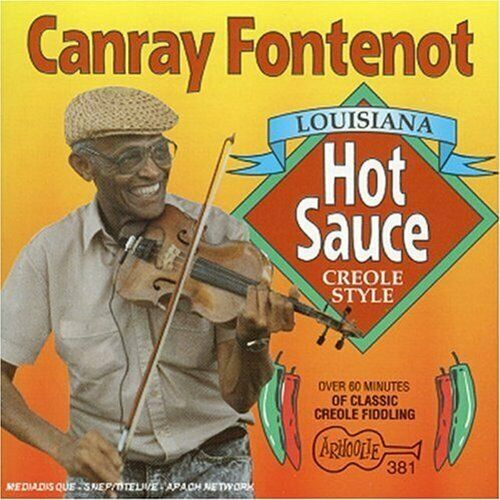Description
Release Date: 1992
Label: Arhoolie Records
Track List
1 Les Barres De La Prison 2:46
2 Canray’s One Step 1:25
3 Tes Parents Ne Veulent Plus Me Voir 2:14
4 Joe Pitre A Deux Femmes 3:27
5 Allons Danser 2:35
6 Bernadette 2:09
7 Bonsoir, Moreau 2:07
8 Lorita’s Blues 2:51
9 La Valse De Mom Et Pop 1:33
10 Two-Step De Grand Mallet 2:02
11 Les Plats Sont Tous Mis Sur La Table 2:06
12 Hey, Hey Blues 2:46
13 Midland Two-Step 1:05
14 La Coulée Rodair 1:53
15 Le Slow Drag A Nonc Adam 1:08
16 La Robe Barrée 1:45
17 Old Carpenter’s Waltz 1:53
18 Bee De La Manche 2:17
19 La Jog A Plombeau 2:28
20 Jig Cajin 0:55
21 Malinda 2:59
22 Fi-Do 2:34
23 Shoo, Black 2:34
24 Canray’s Breakdown 4:28
25 La Table Ronde 1:03
26 Les Blues A Canray 4:30
27 Bernadette 1:18
Personnel
- Canray Fontenot – fiddle, vocals
- Tommy Alesi – drums
- Alphonse “Bois Sec” Ardoin – accordion
- Gustave Ardoin – bass
- Lawrence Ardoin – drums
- Morris Ardoin – guitar
- Tommy Comeaux – guitar, mandolin
- David Doucet – guitar
- Michael Doucet – fiddle, mandolin
- Sonny Landreth – dobro
- Tina Pilione – bass
- Danny Poullard – guitar
- Edward Poullard – accordion
- Billy Ware – percussion
Notes
By 1934, Fontenot had begun performing with Amédé Ardoin, who wanted him to play on a recording session with him in New York; however, his parents would not allow him to travel. In the late 1930s, he formed a string band with George Lenard and Paul Frank, playing boogie woogie, western swing and jazz as well as traditional tunes, but after a few years Fontenot established a more lasting partnership with accordionist Alphonse “Bois Sec” Ardoin (a cousin of Amédé) from nearby Duralde. In 1948 the pair formed the Duralde Ramblers, who became highly popular in south west Louisiana and made many radio broadcasts through the 1950s, notably on KEUN in Eunice. He also began writing songs. His most well-known original songs are “Joe Pitre a Deux Femmes”, “Les Barres de la Prison”, and “Bonsoir Moreau”, which have become standards in the Cajun and Zydeco music repertoires. Fontenot was never a professional musician; he was a rice farmer for many years, and also worked as a labourer in a feed store in the town of Welsh.
Fontenot and Ardoin made their debut outside of Louisiana in 1966, performing at the Newport Folk Festival. At the time, Fontenot had not performed in public for several years, but was persuaded to do so by folklorist Ralph Rinzler. Following the festival, the pair recorded an album with producer Dick Spottswood, Les Blues Du Bayou, and from then on started appearing in a steady stream of festivals in Louisiana and around the world, becoming the last Creole musicians playing music in the “old style”.
In 1986, Fontenot and Ardoin were both awarded National Heritage Fellowships by the National Endowment for the Arts, which is the United States government’s highest honor in the folk and traditional arts. Also in 1986, he and Ardoin were appointed adjunct professors at the University of Southwestern Louisiana. In later years he was featured in many documentaries on Cajun and Creole culture, including the 1989 film J’ai Ete au Bal as well as PBS’s American Patchwork Don’t Drop the Potato. He also performed in New Orleans and toured Europe with the band Filé. There is a portrait of Canray in Yasha Aginsky’s 1983 film Cajun Visits, and in Jean-Pierre Bruneau’s 1993 film Louisiana Blues, edited by Yasha Aginsky.








